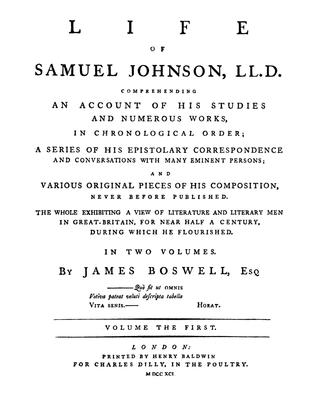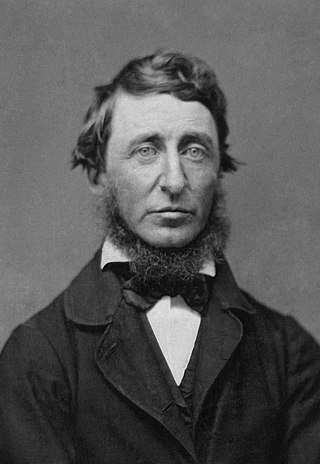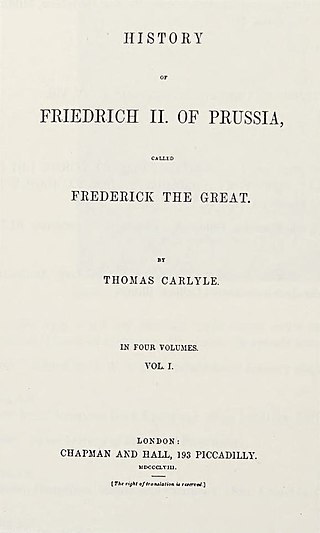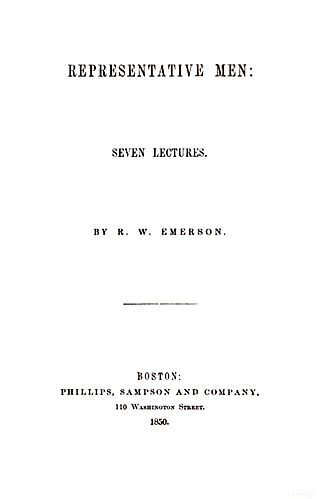
The great man theory is an approach to the study of history popularised in the 19th century according to which history can be largely explained by the impact of great men, or heroes: highly influential and unique individuals who, due to their natural attributes, such as superior intellect, heroic courage, extraordinary leadership abilities, or divine inspiration, have a decisive historical effect. The theory is primarily attributed to the Scottish essayist, historian, and philosopher Thomas Carlyle, who gave a series of lectures on heroism in 1840, later published as On Heroes, Hero-Worship, & the Heroic in History, in which he states:
Universal History, the history of what man has accomplished in this world, is at bottom the History of the Great Men who have worked here. They were the leaders of men, these great ones; the modellers, patterns, and in a wide sense creators, of whatsoever the general mass of men contrived to do or to attain; all things that we see standing accomplished in the world are properly the outer material result, the practical realisation and embodiment, of Thoughts that dwelt in the Great Men sent into the world: the soul of the whole world's history, it may justly be considered, were the history of these.

A hero is a real person or a main fictional character who, in the face of danger, combats adversity through feats of ingenuity, courage, or strength. The original hero type of classical epics did such things for the sake of glory and honor. Post-classical and modern heroes, on the other hand, perform great deeds or selfless acts for the common good instead of the classical goal of wealth, pride, and fame. The antonym of hero is villain. Other terms associated with the concept of hero may include good guy or white hat.

Thomas Carlyle was a Scottish essayist, historian, and philosopher from the Scottish Lowlands. A leading writer of the Victorian era, he exerted a profound influence on 19th-century art, literature, and philosophy.
The Übermensch is a concept in the philosophy of Friedrich Nietzsche. In his 1883 book, Thus Spoke Zarathustra, Nietzsche has his character Zarathustra posit the Übermensch as a goal for humanity to set for itself. The Übermensch represents a shift from otherworldly Christian values and manifests the grounded human ideal. The Übermensch is someone who has "crossed over" the bridge, from the comfortable "house on the lake" to the mountains of unrest and solitude.
The term Fourth Estate or fourth power refers to the press and news media both in explicit capacity of advocacy and implicit ability to frame political issues. The derivation of the term arises from the traditional European concept of the three estates of the realm: the clergy, the nobility, and the commoners. The equivalent term "fourth power" is somewhat uncommon in English, but it is used in many European languages, including German, Italian, Spanish, French, Swedish, Polish, and Russian to refer to a government's separation of powers into legislative, executive, and judicial branches.

Sartor Resartus: The Life and Opinions of Herr Teufelsdröckh in Three Books is an 1831 novel by the Scottish essayist, historian and philosopher Thomas Carlyle, first published as a serial in Fraser's Magazine in November 1833 – August 1834. The novel purports to be a commentary on the thought and early life of a German philosopher called Diogenes Teufelsdröckh, author of a tome entitled Clothes: Their Origin and Influence. Teufelsdröckh's Transcendentalist musings are mulled over by a sceptical English Reviewer who also provides fragmentary biographical material on the philosopher. The work is, in part, a parody of Hegel, and of German Idealism more generally.

The Life of Samuel Johnson, LL.D. (1791) by James Boswell is a biography of English writer and lawyer Samuel Johnson. The work was from the beginning a critical and popular success, and represents a landmark in the development of the modern genre of biography. It is notable for its extensive reports of Johnson's conversation. Many have called it the greatest biography written in English, but some modern critics object that the work cannot be considered a proper biography. Boswell's personal acquaintance with his subject began in 1763, when Johnson was 54 years old, and Boswell covered the entirety of Johnson's life by means of additional research. The biography takes many critical liberties with Johnson's life, as Boswell makes various changes to Johnson's quotations and even censors many comments. Nonetheless, the book is valued as both an important source of information on Johnson and his times, as well as an important work of literature.

Bardolatry is excessive admiration of William Shakespeare. Shakespeare has been known as "the Bard" since the eighteenth century. One who idolizes Shakespeare is known as a bardolator. The term bardolatry, derived from Shakespeare's sobriquet "the Bard of Avon" and the Greek word latria "worship", was coined by George Bernard Shaw in the preface to his collection Three Plays for Puritans published in 1901. Shaw professed to dislike Shakespeare as a thinker and philosopher because Shaw believed that Shakespeare did not engage with social problems as Shaw did in his own plays.

In modern English, the nouns vates and ovate (, ), are used as technical terms for ancient Celtic bards, prophets and philosophers. The terms correspond to a Proto-Celtic word which can be reconstructed as *wātis. They are sometimes also used as English equivalents to later Celtic terms such as Irish fáith "prophet, seer".

Latter-Day Pamphlets was a series of "pamphlets" published by Scottish essayist, historian and philosopher Thomas Carlyle in 1850, in vehement denunciation of what he believed to be the political, social, and religious imbecilities and injustices of the period.

The French Revolution: A History was written by the Scottish essayist, historian and philosopher Thomas Carlyle. The three-volume work, first published in 1837, charts the course of the French Revolution from 1789 to the height of the Reign of Terror (1793–94) and culminates in 1795. A massive undertaking which draws together a wide variety of sources, Carlyle's history—despite the unusual style in which it is written—is considered to be an authoritative account of the early course of the Revolution.

Past and Present is a book by the Scottish essayist, historian and philosopher Thomas Carlyle. It was published in April 1843 in England and the following month in the United States. It combines medieval history with criticism of 19th-century British society. Carlyle wrote it in seven weeks as a respite from the harassing labor of writing Oliver Cromwell's Letters and Speeches. He was inspired by the recently published Chronicles of the Abbey of Saint Edmund's Bury, which had been written by Jocelin of Brakelond at the close of the 12th century. This account of a medieval monastery had taken Carlyle's fancy, and he drew upon it in order to contrast the monks' reverence for work and heroism with the sham leadership of his own day.

"Thomas Carlyle and His Works" is an essay written by Henry David Thoreau that praises the writings of Thomas Carlyle.
A historical figure is a significant person in history.

History of Friedrich II. of Prussia, Called Frederick the Great is a biography of Friedrich II of Prussia by Scottish essayist, historian and philosopher Thomas Carlyle. It was first published in six volumes from 1858 to 1865.

Representative Men is a collection of seven lectures by Ralph Waldo Emerson, published as a book of essays in 1850. The first essay discusses the role played by "great men" in society, and the remaining six each extol the virtues of one of six men deemed by Emerson to be great:
J. R. R. Tolkien's presentation of heroism in The Lord of the Rings is based on medieval tradition, but modifies it, as there is no single hero but a combination of heroes with contrasting attributes. Aragorn is the man born to be a hero, of a line of kings; he emerges from the wilds and is uniformly bold and restrained. Frodo is an unheroic, home-loving Hobbit who has heroism thrust upon him when he learns that the ring he has inherited from his cousin Bilbo is the One Ring that would enable the Dark Lord Sauron to dominate the whole of Middle-earth. His servant Sam sets out to take care of his beloved master, and rises through the privations of the quest to destroy the Ring to become heroic.

Reminiscences is a book by historian and social critic Thomas Carlyle, posthumously published in 1881, which contains two lengthy memoirs of the author's wife, Jane Welsh Carlyle, and friend Edward Irving, together with shorter essays on his father and some of the literary friends of his youth. The book's emphasis primarily rests on Carlyle's relationship with the subjects. The book was begun in 1832 but mainly written in the year following Jane Carlyle's death, in April 1866. Many of its first readers were shocked by the impression it gave of a harsh, gloomy, censorious personality and of a man racked by remorse over his failings as a husband; it did Carlyle's reputation as the sage and prophet of the Victorian era lasting harm. Nevertheless, it is characterized by great vividness and accuracy of detail, and by a comparatively direct, conversational style, and has been called an autobiographical masterpiece.

Thomas Carlyle's religious, historical and political thought has long been the subject of debate. In the 19th century, he was "an enigma" according to Ian Campbell in the Dictionary of Literary Biography, being "variously regarded as sage and impious, a moral leader, a moral desperado, a radical, a conservative, a Christian." Carlyle continues to perplex scholars in the 21st century, as Kenneth J. Fielding quipped in 2005: "A problem in writing about Carlyle and his beliefs is that people think that they know what they are."
Thomas Carlyle published numerous works, and many more have been written about him by other authors.


















